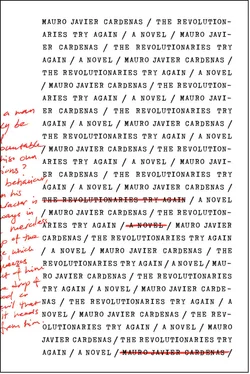—
As if searching for a better position from which to pounce, my father straightened himself on his chair. Perhaps tired of imitating himself, he dropped and dangled his forearms from his armrests. He nevertheless said to my grandmother too bad that voice didn’t advise you and your father on how to keep all that land. This was true. They had squandered it all. Half of my grandmother’s house was now for rent. The other half was crammed with handcrafted armoires.
My father downed his glass of Concha y Toro, my grandmother’s favorite wine. He knew what he had just done. He always knew. And yet his facial expression (his brown contentious eyes at odds with his downcast glances, although it’s possible that over time I have layered these features on a face I can no longer remember) informed us that for him this knowing was punishment enough.
Uncle Fernando, who despite being young and short always looked at ease next to our dignitaries, said what are you, the Grinch? Lighten up, Antonio. You’re scaring the children. My Uncle Fernando was the only one in our family who could reproach my father. Three or four years earlier, after a series of my father’s business ventures floundered, my uncle had secured my father a post as head of a minor government agency in charge of shipping office supplies to government bureaus across Ecuador, and so of course my father could not yell or swear back at him like he did with the rest of us. I liked Uncle Fernando. He sent my mother good presents even after she divorced my father, sported slim Italian suits, raced European sports cars despite the ban on imports. He also worked as a personal advisor to the minister of finance, whom he had known since his days at San Javier High School.
—
So many hours of his summers with his father in Quito were spent under long, empty office desks inside that minor government agency, Antonio thinks, playing with a calculator that must have had games on it because he probably spent all eight office hours a day under those long, empty desks along empty hallways instead of wandering the city on his own, instead of writing love letters to the neighbor from Sweden at his father’s apartment building whom his father was to introduce him to and whom he was to date the summer after, when he was already too tall to bury himself under those long, empty office desks (and what he remembers most about that neighbor from Sweden is how proud he’d been of declining to sleep with her because he was fifteen and intercourse before marriage was a mortal sin — anyone want to guess what the Drool was doing with the pigeon from Sweden? — I didn’t have the heart to inflict that kind of pain to our Madre Dolorosa — with the same hand you masturbate you stab a dagger into our Madre Dolorosa’s heart —), and sometimes the secretaries who were probably his father’s lovers would stop by his lair under those long, empty desks and ask him if he wanted or needed anything, hoping to ingratiate themselves with Antonio as if he had any sway at the minor government office his father managed, bah, on the contrary: if he could go back in time he would have denounced them — or you would try to sleep with them? — probably.
—
My father’s smile tried to mask any signs of strain. He echoed my uncle’s jovial tone and said isn’t it Mass time already? You Cristianitos are going to be late.
My father lit a cigar, and my grandmother, with synchronic urgency, as if cued by his silver lighter’s snap, tolled her tiny porcelain bell, which to me sounded like a poodle’s. In restaurants she would deploy her bell if she did not receive immediate service. At home it was part of her daily meals. Maria, caramba, pay attention, she said. An ashtray for Don Antonio.
Since my grandmother sat at the head of the table with her back to the kitchen, she could not see Maria, her most recent maid, trying to suppress her scowl. In a country where more than 60 percent of the population lives in poverty, any family with a decent income can afford a live in maid. And my grandmother went through them as if they were a disposable breed of humans. At first they came the safe way, recommended by her fellow obstetricians, but after the recommendations ran out, my grandmother had to hang a Maid Wanted sign outside her gate, which of course lured strangers, who eventually absconded with her silverware. My three aunts liked Maria, though, and as she approached us, my aunts’ glances pleaded with her: patience with the old woman, please, patience. I had never seen my aunts’ pleads before.
—
So what that I hadn’t seen my aunts’ pleads before, Antonio writes along the margins of his baby christ memoir, crossing out the sentence about not seeing his aunts’ pleads before, he doesn’t remember that seeing his aunts’ pleads for the first time carried any significance for him, so perhaps he’s mindlessly following the narrative convention of these coming of age stories in which the first time the boy sees something out of the ordinary he undergoes a transmogrifying shock or revelation, the word transmogrifying, incidentally, which rhymes too much with the word ogro, should only be unfurled to mock transformative feelings, the word unfurl, Antonio writes, likewise.
—
Without raising her gaze Maria placed the ashtray by my father, whose eyes became fixed on the curvy silhouette beneath her white uniform. Her one piece uniform was several sizes too small (we could see her brown shoulders and thighs, although we were not staring), not out of coquetry but because it was the same uniform the other maids had had to wear and hand wash every other day. Maria hurried back to the kitchen, leaving behind her scent of talc and sweat. We did not know it at the time, but that night was to be Maria’s last.
My grandmother laughed and clapped at something my grandfather had said. I grew thankful at the possibility of merriment, hoping that it might calm my father before it was time for my speech. I cannot tell you what suddenly lifted my grandmother’s mood. Her moods swung as widely as my father’s, and so it could have been nothing at all, or the tiny sound of her porcelain bell, or the way her Christmas lights reflected on our faces so as to make us look happier, or my grandfather holding her hand, or too much Concha y Toro.
There are family members whose roles in one’s memories, through no fault of their own, become so inconsequential that eventually one is free to remember them in whichever way one chooses. This is how I choose to remember my grandmother: dancing a cumbia on her seat during our family dinners, raising her wineglass and singing tómese una copa / una copa de vino / ya me la tomé / ya se la tomó / ahora le toca al vecino, which translates to drink another cup of wine, and, when you are done, it is your neighbor’s turn. By song’s end my grandmother would turn to my grandfather and call him mi perrito, my little doggy, and my grandfather would reciprocate by barking or asking her to dance. Much later, after the cocktails and the dance, they would lie on the sofa like exhausted lovers, my grandmother bunched against my grandfather, who would have fallen asleep without fanfare sometime earlier. My grandfather was the only one in the family who prayed to the baby christ regularly. He had built a wooden altar for this purpose, and since he had placed it by the entrance to their bedroom, we always had to be careful not to swing their door open, lest we bump the door against his worn kneeler and disrupt the order inside his altar. Every space on his altar was crowded with rosaries, scapulars, fringed crosses, miniature images of saints too fragile to be taken out of their plastic sleeves, so many of them that sometimes we wondered if my grandfather bought a new one every week, and whether he did so in honor of the baby christ or to keep himself company in those long hours of fasting and prayer. Most of the time we didn’t have to worry about bumping the door against my grandfather because, when he was by his altar, my grandmother would always tiptoe out of their bedroom, and like a guard who thinks her task is as important as that of whom she guards, she would admonish us and ask us to keep quiet. Silence. Grandpa Antonio is praying.
Читать дальше












